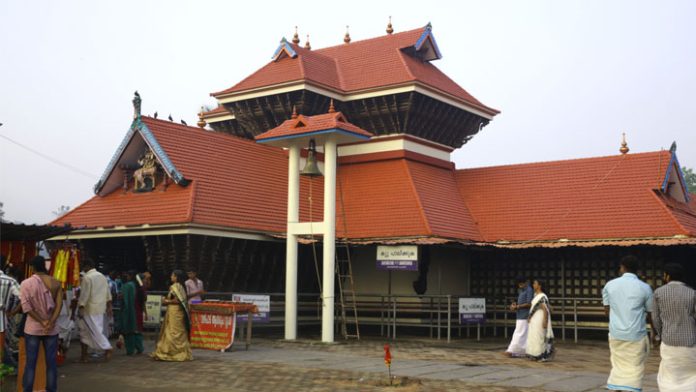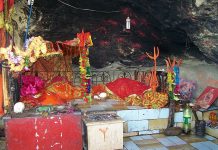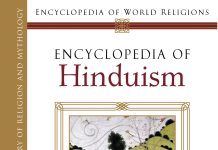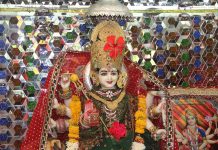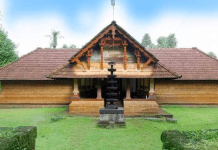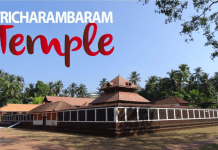Mystical Facts of Chakkulathukavu Temple
Chakkulathukavu is a Hindu temple, dedicated to goddess Durga. The temple is located in Neerattupuram, Thalavady panchayat, Alappuzha District, Kerala and is one of the most popular temples in the state.
Bhagawathi is one of the most popular deities in the area. Pilgrims from all over South India visit and worship the Devi.The temple was less known even to the local residents and lay as a family temple of a local resident. This remained until it was renovated a few decades before.
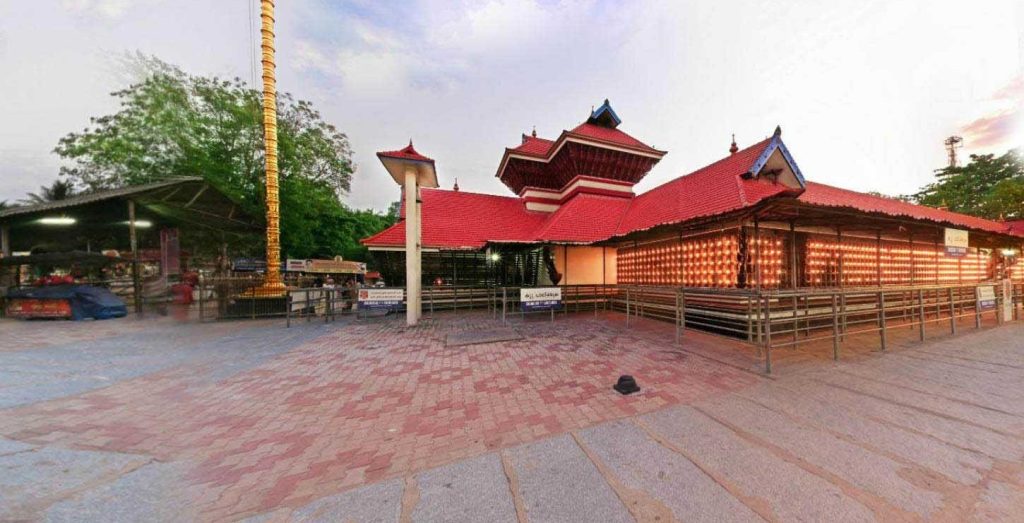
Located on the banks of the holy Pampa River, this temple has attracted pilgrims all over Kerala and became one of the most popular pilgrim centre of the state, thanks to the excellent promotional strategy of the temple management.
The major festival is Pongala which takes place in the temple during the month of Vrischikam (November/December).This is the time when the glory of the Goddess is at its peak. Lakhs of women devotees gather around the temple as early as even one week before the function. The temple premises will be overcrowded and the devotees arrange places for offering the pongala on both sides of the main streets. The queue usually extends to a surprising length of 20 km. Rice, coconut and jaggery are brought by women devotees along with round earthen pots for cooking. The Chief Priest lights the main hearth from the divine fire inside the sanctum sanctorum. This fIre is exchanged from one oven to another.
Panthrandu Noyampu is another festival celebrated at the temple. This is the type of fasting and prayer which qualifies the devotee for eternal blessings of Chakkulathamma. This fasting starts every year from the first day of the Malayalam month of Dhanu till the twelfth.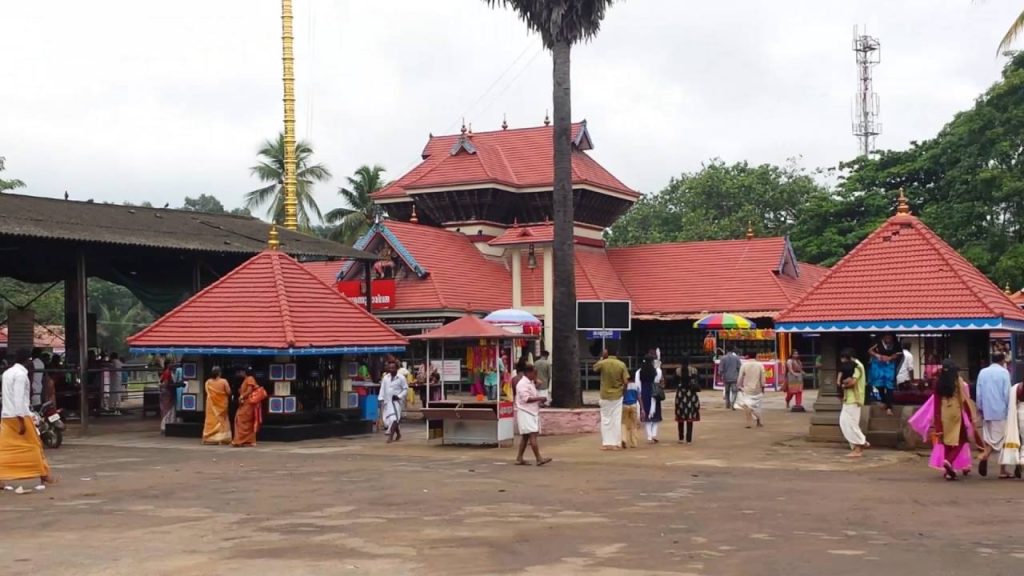
History
The ancient history of the temple has some divine connections with the story of Sumbha and Nishumbha referred to in the Devi Mahatmyam. The story goes that two demoniac characters called Sumbha and Nishumbha derived super human powers through rigorous meditation of Lord Brahma. They received a boon that they could be killed only through a battle with woman. Such a condition being almost impossible, Sumbha and Nishumbha conquered Indra and other Devas. They became the unquestioned monarchs of the three worlds. The helpless Devas under had to flee away and take shelter in remote jungles.
Saint Narada feeling pity at the misery of the Gods approaches his father Lord Brahma. Brahma reminds Narada that ups and downs are the law of life and that was what the Gods were experiencing. There was only one way out for this despicable state of affair. Only one power could restore power and prosperity to Gods and that power was none other than the very Goddess. Devas accordingly moved in search of Goddess. Reaching near Himavan, the epic King of the mountains, they started chanting powerful mantras to appease the Goddess. They plunged into a he artful tribute of the Goddess who in herself was power, knowledge, creativity, benevolence and blessings.
Goddess Parvathy had just arrived on the banks of river Ganga. Echoes of the mantras reached her. There was a touch of grief and pleading in the sounds of Devas. Goddess Parvathy grasped the pitiable plight of Devas. There emerged another Goddess from within her as if something comes out of a cover. This was the incarnation of Goddess Durga, having taken a divine form to rescue the Devas from the hardships caused by the asuras.
The story culminates in a terrible fight between the ‘Goddess and Asuras under the leadership of Sumba and Nishumbha. It was an encounter unheard of ever before. Needless to specify, all the asuras were annihilated by the Goddess. The Devas got back the early powers and prosperities. Sage Narada appears in front of them and exults them about the invincibility of goddess Durga. She was the cause as well as witness for the creation, maintenance and destruction the universe, told Narada.
It is believed that the Goddess residing in Chakkulathukavu is a wholesome reaction of this all-pervading Goddess namely Durga.
Major Festivals
Chakkulathukavu Pongala
This is the phenomenally renowned festival that takes place in the temple during the month of ‘Vrischikam’ (November/December). This is the time when the glory of the Goddess is at its peak. Lakhs of women devotees gather around the temple as early as even one week before the function. The temple premises will be overcrowded and the devotees arrange place for offering the Pongal on both sides of the mains streets. The queue usually extends to a surprising length of 40 km to 50 km.
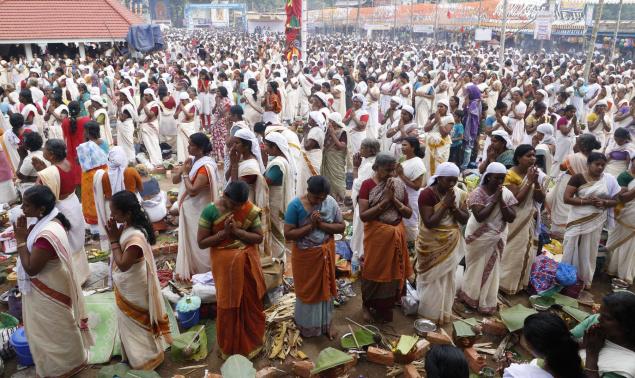
Rice, coconut and jaggery are bought by women devotees along with round earthen ports for cooking. The Chief Priest lights the main hearth from the divine fire inside the sanctum sanctorum. This fire is exchanged from one over to another. Every year at the time of lighting the main hearth an eagle is found to circle far above the sky. This is an unfailing blessing of the Goddess. The sight of the bird drives the devotees into an inexplicable feeling of ecstasy. They utter the divine names of the mother and the atmosphere echoes and reverberates with a thousand names of the Goddess.
The origin of this ritual dates back actually to the origin of the temple itself and takes us once again to the story of the hunter and his family detailed into he temple history. The hunter and his family members cooked their food in earthen pots. They always set apart a part of their food as an offering to their goddess. One day they were very late to return home after collecting wood in the jungle. They felt extremely sad that they could not submit the daily part of their food to the Devi.
Overtaken by unbearable sorrow they fell upon the feet o f the ‘Goddess and asked pardon for the delay. Then they rushed immediately to cook the food. But they found to their utter surprise that all the earthen pots were filled with cooked food and fruits. They knew for certain that it was the Goddess Herself who cooked the food for them. They heard a voice in the atmosphere. ‘My Children, I have prepared this food for you. I will always be too near those who are devoted and pure. Take this food and have rest’. We find the supreme moment of the goddess herself preparing food for the devotee.
The Pongala in the temple is a symbolic reminder of this age-old incident. Devotees prepare the food as humble offering to the mother. It is believed that the Goddess herself offers her august presence near each Pongala hearth as the cooking is done. Several are the instances where the griefs, problems, and confusions of the devotees are washed away through the Pongal offering. It is also a symbolic reminder that devotion reaches the full circle through complete submission and total surrender at the lotus feet of the Mother. The Pongala festival in this temple is one of the foremost rituals compared to any thing of the same in the whole state of Kerala.
Naree Pooja
Naree Pooja held at Chakkulathukavu Shree Baghavathy Temple on Dec 19,2014. The Pooja performed by Brahamasree Manikuttan Namboothiri to Mrs Matangi Sathaya Murthy.
Hindu tradition had always bestowed reverence and acceptance to Indian womanhood. It often reminded humanity that a woman who is respected is the cause for prosperity whereas a woman is dishonoured is exactly like fire and can annihilate everything. We had even women who rose themselves to the pinnacle of spirituality and gave new dimensions to our culture. The Brihadaranya Upanishad pictures Maitreyi whose question to her husband Yaganvalkya is thought provoking. ‘Oh Lord shall I reach that state of fulfillment of ‘Amritvatva” if the whole of this prosperous universe becomes mine? Or else tell me how I can reach this state of ‘Amritvatva’.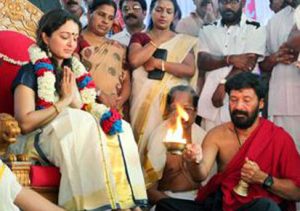
Such subtle tones of spirituality are reflected in the lives of saintly women like Gargi, Sarada Devi or the like. Indra who glorify at the position of women in our cultural society. Rig Veda shows us how Indra was all praise for his wife who he believed as the basis of his prosperities. We again have the brilliant scene of Lord Shiva seating his wife Parvathy in the diamond decked throne in the evening before starting the dance. The Lord was fingering towards the importance of women in the family in order to usher in peace and progress. We may also remember the famous saying.
‘Yethra Naryasthu Poojayante
Remantha thathra Devatha’
Where ever women are adored the Gods get pleased. Our temple has absorbed this glowing concept and introduced a very appealing ceremony ‘The Naree Pooja’. Women are seated on specially arranged seats. Their feet are respectfully washed. This is an indirect expression of the divine Mother. Thousands of women are invited to take part in this function. Innumerable devotees stand as witness to this rare ritual that proclaims the potency and glory of the divine Mother.
The First Friday
The first Friday of every Malayalam month marks a spiritually significant day for the Temple. Devotees who observe rigorous fasting and penance reach the shrine on this day. The number of persons who gather themselves to have a visit of the Mother on this day are literally countless. Special spiritual functions are also conducted on this day. The small idol of the God which is usually placed inside the sanctum sanctorum beside the main idol is carried in procession and brought to the specially arranged place for prayer.
Devotee sings hymns and songs of Mother. Scholarly and informative talks are made about spiritual subjects, the chief priest and members of the Pattamana Illom will lead the functions. They will be accompanied by Vedic Brahmin of depth and devotion. As the function progresses the atmosphere is charged with a rare glow of spirituality and divinity.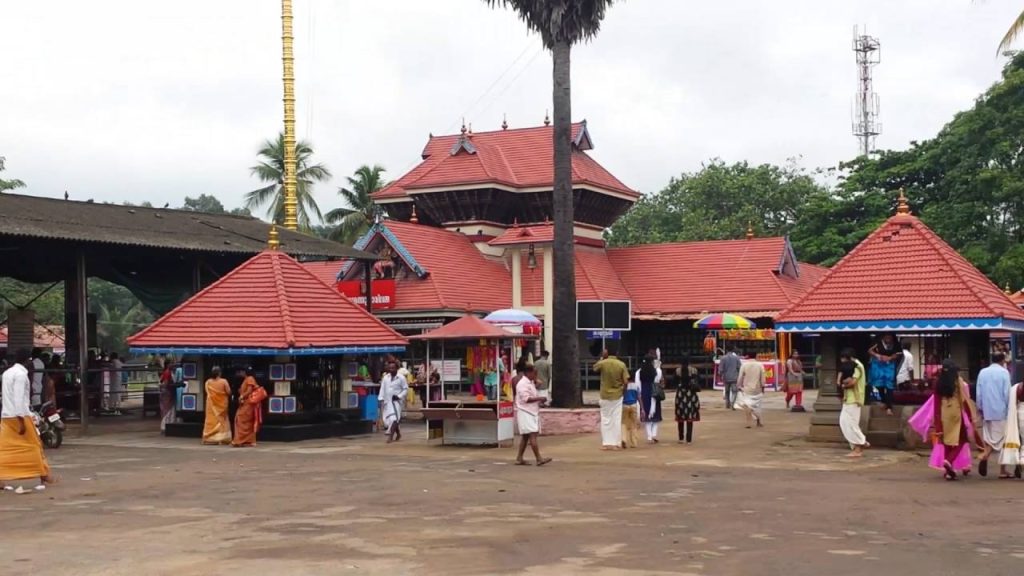
A remarkable feat of the first Friday is the pledge that some devotees take against the habit of intoxication. Use of drugs and liquor have always been a cruel curse upon human beings. How many families loose the foundation and are upturned due to such bad habits, especially of male members. A reminder or pointer may save many such persons. Thousands of devotees which have found it difficult to liberate themselves from the octopi an clutches of alcohol reach the temple on the first Friday. They have come with an ardent decision to brush away their bad habits. They touch the divine sword of the Goddess. The chief priest recites the oath of abstention from liquors. They repeat the prayers. The Cardinal message of this prayers sums up that they will abstain themselves from the use of liquors and drugs and that they will utilize their lives for the well-being of their family and society.
Many families have been saved by this prayer. Number of women devotees rush to the temple on Friday to express their oceanic gratitude to the Goddess for having saved their husbands or sons and their family altogether from the dare devil of intoxication. And they see the supreme Mother Goddess with the radiance of a thousand suns spreading Her gentle smile upon them.
The pledge against intoxication in front of the Mother goddess is perhaps the one and the only form of its kind in the whole temples in India. It carries an added significance that the divine possibilities of religion are used for transforming human beings towards better citizenship. Wonderful results are recorded in the temple about having cured many persons. The Goddess surprisingly works when men and medicine fail.
During the first Friday the devotees receive a unique type of medicine water famously known an s ‘Oushadha Vellam’. Drinking of this water is proved to heal all types of ailments. A long queue of devotees is seen waiting to receive the medicated water. This water with a number of ayurvedic herbs and roots which have proved results of healing and softening the human body is taken inside the sanctum Santorum. Special Poojas and mantras are performed. The water gains superhuman powers through the blessings of the Goddess. The theories of science or medicine attain super human dimensions when a divine touch falls upon them. The divine medicated water that is supplied during the first Friday is a ocular proof of concept. How many are the pilgrims who have been saved from their problems and despairs through a faithful use of ‘Oushadha Vellam’! The prayer is in a prescribed form packed with meaningful words of spiritual depth. It echoes the aberration of materialism and the vital need to turn towards the Goddess. The prayer requests the Goddess to melt down all the grief, trials and tribulation from the life of the devotees. It also invokes the supreme Mother who works unknowingly behind all the impulses of this universe-that Mother who see the cause and effect behind whatever that happens in this universe.
Participation in these factions and visit to the Goddess are sure to bestow all prosperities like dutiful Children, supreme knowledge, rightful marriage, robust health, annihilation of cruel enemies and like.
From the first of Dhanu to the twelfth of malayalam month the devotees observe the ‘Panthrandu Noyambu’. This is proved to bless the pilgrims with infinite comforts.
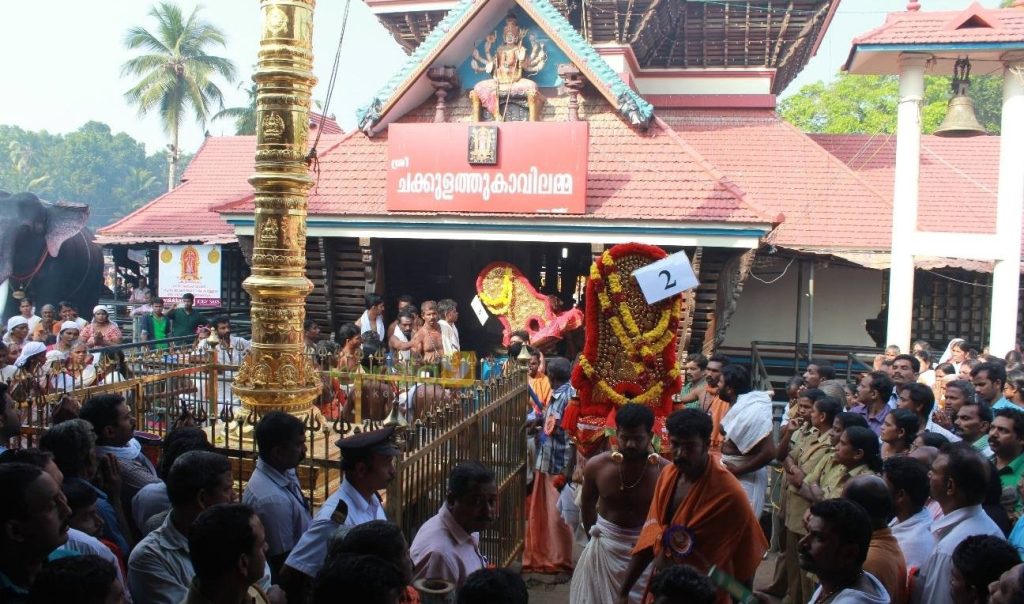
When we make a statement about anything we have to supplement that this is so according to our existing knowledge till the moment of the statement. But there are things that transcend the frontier of logic and arguments. This is a sphere where the human brain has limitations. It is there that wonders takes place. It is there that the supreme power being this universe manipulates and mesmerize. This is what we finds in the famous temple of Chakkulathukavu. It is here that thousands assemble to have a sight of the Mother. It is here that we see the sight of submission and surrender. It is here that a gentle smile and a lotus feet radiates heavenly sunshine upon the flower of human life Yes the supreme abode of universal Goddess ‘The Chakkulathukavu Temple’.
Thrikkarthika that falls on the Malayalam month of Vrischika is an important day of the temple. This day became famous after a surprising incident that took place in 1851. A Friday of 1981. 3.30 am in the early morning. Some devotees had gathered to have the ‘Nirmalya Darsaam’. Everyone was amazed to see rings of perfumed smoke all around. Rare glow of light was seen in front of the temple. No body could discern what was happening. As the priest opened the temple, everyone was spell bound. All the lamps inside were alive with a unique touch of brilliance.
Mode Of Fasting On Friday
Celibacy is a must during the day of fasting. The devotee should unfailingly abstain himself from non vegetarian food, liquors and the like. They should have their bath in the morning as well as in the evening. Sick people can take exemption according to circumstances. Both male and female members irrespective of age can observe the fasting observing the fast. Those women who are regularly observing the fast on every Friday need not think of the fasting has broken due to menses periods. They need only remain pray fully and such Fridays should not be taken as a day of fasting for completion of any desired number of Fridays. Those persons who observe the fasting only for one or two Fridays of every month should observe the fasting exactly on those periodic Fridays on the succeeding month of regular order. Mental purity and unpolluted devotion should be developed. Births or deaths in the family should be deemed as breaking the fasting. In such cases fasting must be again begun from the beginning.
Upavasam
Food or drinks should not be used. Remain throughout the day with prayers of the Goddess.
Thrikkarthika
Thrikkarthika that falls on the malayalam month of Vrischika is an important day of the Temple. This day became famous after a surprising incident that took place in 1851. A Friday of 1981 at 3.30 a.m in the early morning. Some devotees had gathered to have the ‘Nirmalya Darsanam’. Everyone was amazed to see rings of perfumed smoke all around. Rare glow of light was seen in front of the temple. No body could discern what was happening. As the priest opened the temple, everyone was spell bound. All the lamps inside were alive with a unique touch of brilliance.
The KarthikaPillar
A tall arecanut tree is erected for this purpose. Plantain, straw and similar items are wound over the pillar. This pillar is symbolic of all evils. As dawn blooms, the Goddess is respectfully invoked and seated east wise in front of the temple. The pillar is given fire now. Wild flames seem to reach the sky. Finally the flames subside. The principle is that all the badness is given to flames thereby paving way for all goodness to emerge. Immediately after the burning of the pillar, a number of gentle flames are seen coming alive from the small clay dishes arranged all around. This is the Lakhadeepam or lakh of flames. People kindles the small clay dishes which contain oil and cotton thread. It is a sight of sights to see the whole temple surroundings immersed and illuminated by active flames. This ritual again has a symbolic moral that goodness ultimately dominates badness. The yellow flames dispel all layers of ignorance from the human minds and equip them with real knowledge.
The goddess is then invoked back to the temple. Deeparadhana is then performed.
Kalamezhuthu
This ritual has both the influence as well as tremendous mental sense of awakening. The divine of the goddess is drawn in an elaborate size using differently coloured poweders.
Nirapara
All the prosperities of this universe are a blessing that comes from the mother. After all, nature is one with the Goddess and whatever we receive is Her boon. Money, agriculture, handicrafts and everything prosper through her silent sanction. This belief prompts the devotees to offer helpful of paddy in the ‘Para’ or rational vessel to the Goddess.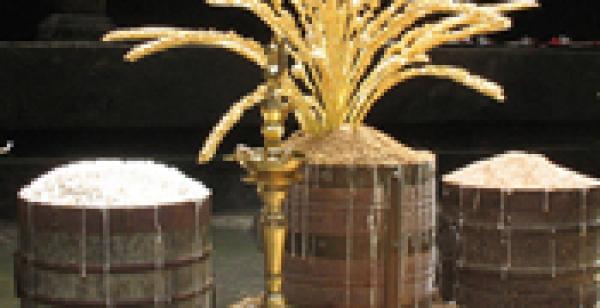
Chakkulathukavu Pandrandu Noyampu
This is the type of fasting and prayer which qualifies the devotee for eternal blessing of Chakkulathamma. This fasting starts every year from the first day of the Malayalam month of Dhanu till the twelfth. Men and women irrespective of age, caste or creed can resort to this powerful fasting. They have a streamlined life with a bath in the early morning and chanting of Devi mantras as far as possible. They adhere to strict vegetarianism and totally shun cigarettes or liquors. ‘Brahmacharya’ or a condition of celibacy is observed during this period. The devotee uses only fresh and moderate food. He has to be calm and nonviolent in thought, word and action. Mental and bodily purity, unpolluted love towards god and fellow beings etc have to be specially boosted during the time of fasting.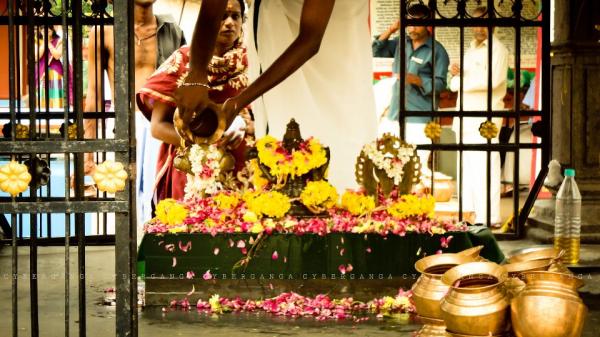
Visits to Holy places and temples, recitation of scriptures and mingling with sages and the learned are a lively part of this interval. Several are the pilgrims who reach the temple with ‘Irumudikettu’ (bag with two parts) upon their heads, Eleventh day is significant and there is the ‘Kalasabhishekam’. On the twelfth day children, women and men hold ‘Kavadi’ (Semi circular wooden frames decorated with flowers and feather) This is called ‘Ammachi kavadi’.
The results that the devotes gain through this act are varied and wonderful. They are blessed in the multifaceted phases of material existence like proper marriage, worthy children, fruitful jobs, real knowledge and prosperities. Many are the persons who were able to shatter the fetter of evil friendships, intoxication destructive ways of life or aberrant existence. Discrepancies of family life, unexpected attack of disease and absence of real love are all rectified. In short the ‘Pandrandu Noyambu’is a ladder of blessing to reach pastures of peace and prosperity.
Pilgrims attain an indefinable sense of security and sanctity after observing this penance. They chant the names of Devi with added vigor and commitment. When they return after the 12th day they have only prayer and that is for a blessing to observe this fasting in the coming years also.
The Temple is situated in the border of Pathanamthitta and Alappuzha Districts. It is 9 Km westward from the town of Thiruvalla in Neerattupuram Junction. The famous rivers of Pampa and Manimala flow on either side of the Temple.
Temple Vazhipad |
|
| Item | Rs. |
| Ganapathy Homam | 30 |
| Archana | 10 |
| Pushpanjali | 50 |
| Raktha Pushpanjali | 60 |
| Navagraha Pooja | 100 |
| Choroonu (Annaprasanam) | 25 |
| Kadumpayasam | 40 |
| Kudumba Archana | 25 |
| Lalitha Sahasranam Pooja | 50 |
| Mrithyunjaya Pooja | 50 |
| Pithru Pooja | 25 |
| Bhagavathy Seva | 100 |
| Kumkuma Pooja | 100 |
| Chen Guruthi | 250 |
| Valiya Karim Guruthi | 750 |
| Erratta Guruthi | 500 |
| Valiya Pooja | 500 |
| Chowa Pooja | 350 |
| Karma Pooja | 400 |
| Anjana Guruthi | 350 |
| Nirapara | 50 |
| Neeranjanam | 25 |
| Shatru Samhara Pooja | 100 |
| Thrimaduram | 25 |
Advance Booking Poojas Charge |
|
| Item | Rs. |
| Ashta Draviya Ganapathi Homam | 300 |
| Ganapathi Homam (with Karuka) | 50 |
| One day Pooja | 3000 |
| Oru Nerathe Pooja | 1500 |
| Muzhukappu (Devi) | 500 |
| Karthika Pooja | 1500 |
| Adianthra Pooja | 2001 |
| Palpayasam | 100 |
| Aranazhi Payasam | 500 |
| Kalasham | 250 |
| Noorum Paalum | 100 |
| Manjaneerattu | 3001 |
| Kalabha Abhishekham | 7001 |
| Kumkuma Abhishekham | 7001 |
| Velli Thiruvabharanam Charthi Pooja | 1001 |
| Oru Divasatha Vayana | 1000 |
| Udayasthamana Pooja | 5001 |
| Sakthi Pooja | 1150 |
| Chuttu Vilakku | 5000 |
| Uthasva Pooja | 5001 |
| Pithru Sakthi Pooja | 650 |
| Thanga Thiruvabharanam Charthi Pooja | 5001 |
HOW TO REACH CHAKKULATHUKAVU TEMPLE
By road : Buses reach Chakkulathukavu from several places of Kerala. From Thiruvalla one can reach here in 15 minutes drive by car, KSRTC buses ply every 10 minutes from Thiruvalla to Chakkulathukavu.
By rail : Devotees coming either from Ernakulam side or from Thiruvananthapuram side by train should get down at Thiruvalla, from there are regular bus services to Chakkulathukavu. For further information related to the temple can be contacted through e-mail.
By air : Devotees who come by Air can land at Cochin or Trivandrum and proceed
Distance From Airport
Kochi- 92 Km
Trivandrum- 95 Km
From Railway Station
Eranakulam South Railway Station – Vyttila, Alapuzha – Chakkulathukavu Temple- 88 Km
Eranakulam North Railway Station – Palarivattom, Vyttila, Alapuzha – Chakkulathukavu Temple-86 Km
Phone
Tel : 0477-2213550, 2210999
Mob : 09447104242 , 08891104047


























